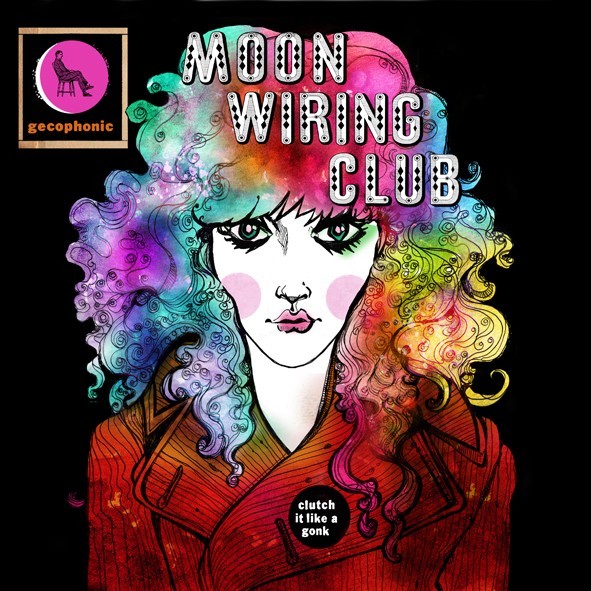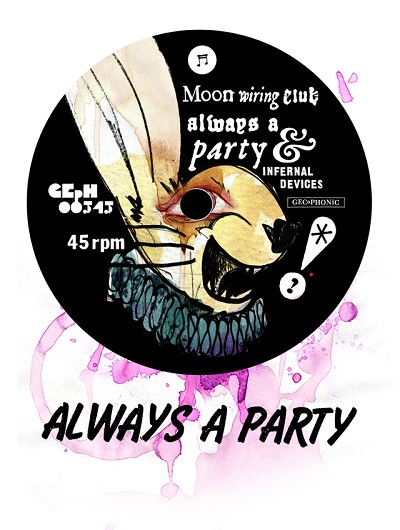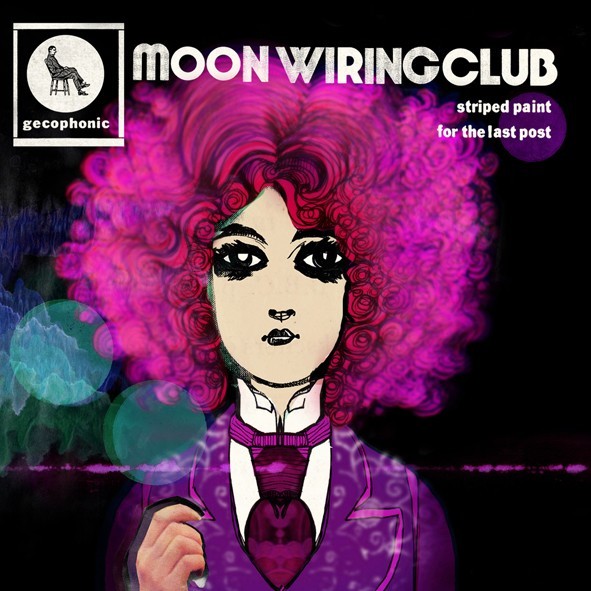Pick up a tourist guide to the town of Clinkskell, perched amongst the cold and misty moors of Northern England. Walking past the usual mise-en-sc̬ne that accompanies such a town Рone of oak trees, unassuming tea houses and free-standing thatched cottages flaking against the wind Рyou will eventually come to Old Gloaming Street.

This street is unlike most streets you are likely to encounter in England, however. There, you will find the Blank Workshop, where, amongst many others, Mr Arnold Van Rensburg sells his famous hallucinogenic Scrumptytons Sweets that induce “conversations with unseen feline acquaintances’ and “night terrors.’ Mr Kemble Oldknow will be busy compiling material for Gelographic Radiotelevsion; serials such as 13 O’Clock Hallucinations and Ghost Telegrams. Frederick Spoons is researching his newest book on secret bird languages, and Gecophonic Recording Productions is releasing its newest otherworldly sonic explorations.
One couldn’ be blamed for thinking that the quick survey above was all lifted straight from an English fairy tale or children’ novel. Instead, this phantasm exists not in a book, but at a URL. Spend some time clicking around the Blank Workshop website, and soon the town of Clinkskell will reveal itself in intimate detail. Browsing through the site becomes an act of discovery, as if one was actually treading its streets. One can pop into the local bookstore to buy fantasy fiction, meet the mysterious locals in full illustration, read the Mayor’ welcoming address to the town, and even look around at some of the town’ strange architecture.
All this springs from the mind of Ian Hodgson, whose electronic music project, Moon Wiring Club seems at first to play only an incidental role in the wider fanfare of this odd but delightfully coherent world. It is not surprising, then, to find that before he was making music, Hodgson was already writing books and fairy tales for children: “The whole idea of Clinkskell derives from the children’s book I was writing years ago, and it predates any music I’ve composed.†This knack for storytelling – for “spinning a tale’ – has never abandoned Hodgson. Primary to anything else, it is the irrepressible legacy of C.S. Lewis, of English folklore, and animated children’ books, that looms as the largest influence on Moon Wiring Club’ musical style. What initially attracted Hodgson to these stories was how “the world presented [was]similar to the actual one around us, but you have to take the time to look for it.â€
This trope of the strange being enmeshed in the familiar endures in the eight albums he has self-released since 2007, including two from 2011 – Somewhere A Fox Is Getting Married, and Clutch It Like A Gonk. Like in the fictional worlds of The Prisoner or The Adventures of Alice in Wonderland that play on a similar ethic (think how an antique wardrobe acts as the portal to Narnia, for example), in Clinkskell, the iconic idiosyncrasies of English life, such as “teashops, stately homes, ruined buildingsâ€, become fertile ground for exploring the odd, uncanny and magical. It is a combustive combination that gives insight into an imagination that seems both boundless and irrepressibly spontaneous. Under Hodgson’ eye, teapots, antiques, and matrimony take on warped second lives, almost as if taunting their former selves. In the stories that Moon Wiring Club weaves into sound, the bizarre always rubs shoulders with the inane, the normal always borders the absurd.

A fascination with the double life of pastoral imagery would not seem to naturally lend itself, at least intuitively, to the sonic vocabulary of modern electronic music. Generally speaking, synthesizers, drum machines and MIDI controllers have served to imagine images of the future, not to re-articulate stories that stand as period pieces of English civility. It has not been electronic music, but rather television costume dramas like M.R. James’ Whistle and I’ll Come To You, the Victorian illustrations of Richard Dadd, and a corpus of children’ literature that has kept this storytelling tradition alive. Moon Wiring Club breaks this standoff by making the themes of fairytales and children’ stories both the subject matter and working material of the music. “The idea of marriage is obviously a strong theme throughout folk tales and fairy tales, and has romantic weight,†Hodgson notes, “I like the use of romance and magic to frame electronic music in something other than (and I’m clearly generalising here) ‘dystopian future’ or ‘grid pattern’.â€
This change in focus required Hodgson to look at fresh sources and techniques for his sampling. A self-described “avid collector†of “vintage British films and television, and 2nd hand spoken word/children’ LPsâ€, he takes snippets of their “spoken atmosphere†and reassembles them with other samples to form his own dialogues and characters. For example, in the track “RSVP VIP Fresh’, from last year’ excellent Somewhere a Fox Is Getting Married, it is a line from a Lord Tennyson poem (“fresh as the first beam glittering on a sail/that brings our friends up from the underworld’) that forms the centrepiece of the track. It’s dropped in the style of an Ice Cube punchline, had he lived in Cornwall his whole life and attended performing arts school. But unlike how sampling is used in say, hip-hop, where the basic source material is manipulated into the melodic or rhythmic fibre of the track, Hodgson uses his samples mainly for plot creation. This has allowed Hodgson to exercise his storytelling prowess, “to present an ‘audio story’ in a way that purely instrumental or vocal music cannot.†Relying on the weight of the words with their natural cadences and intonations, the samples act like the narrative voice-over, skewing the plot towards unexpected ends. It gives every Moon Wiring Club track its own discernible role in the story, forming chapters or scenes in a vivid narrative album arc.

Hodgson combines this novel sampling technique into a musical style that leads to a disorientating and often unnerving listening experience. Limited by his equipment – by modern standards, a blasphemously primitive set-up of a Playstation 2 and a second-hand copy of MTV Music Maker – Hodgson can only sample very brief portions of dialogue at a time, and builds up his drum lines hit by hit. Thick, dank layers of bass and clunky drum lines coil between the manic swirl of voices, utterances, sighs and exclamations, with which he crams the track’ space, snuffing it of breath. One can very easily get lost in the over-stimulated nature of the music, despite its minimalist origins. It does not take much to be dizzied by a swarm of abstract meanings and heavy reverb, the compressed spaces of dialogue and drum patterns. It is with a degree of tongue-in-cheek, then, that Hodgson can construct a track around the cycling phrase “disorder, derangement, disunion, jumble, mix up,†delivered in the most plum of English accents.
Beyond the disorder and derangement that can be heard, what really lends Moon Wiring Club its unique taxonomy is a groundlessness that is not aurally represented, but is rather felt, or sensed. The most striking feature of listening to a Moon Wiring Club album is struggling to find a way of confidently placing one’ finger on what is actually being listened to. We are hearing sounds and voices, but where do they actually exist? After all, the music is ultimately delivered as its own fairy tale, told through the appropriation of troves of salvaged audio from other fairy tales, that takes place within the fictional town of Clinkskell, which supposedly lies amongst the reality of Northern England. Hodgson uses past artefacts to reinvent a new type of reality; a fantastic world of bizarre creatures and plot lines that exists amidst the hyperreality of the internet. In short, Moon Wiring Club seems to float in a world of its own making: it is not exactly music from our time, but neither is it entirely from the past. It does not seem to be of this world, but nevertheless exists within it. The overwhelming sensation one gets from listening to a Moon Wiring Club album is that one is experiencing an apparition – the ghost of sounds that once had a firm existence, but now lie only in the semi-reality of a new assemblage.
This eerie feeling of semi-reality, of presence-absence (or absence-of-presence), places Moon Wiring Club’ work alongside a wave of English contemporaries whose output since the early-to-mid 2000s has typified the Hauntological shift in modern music. Artists like The Advisory Cirle, Belbury Poly and The Focus Group (who have all found their home on the extraordinary Ghost Box label) represent a generation of musicians who spent their youths glued to English television programs like Dr. Who, or listening to the library music of Delia Derbyshire and the BBC Radiophonic Workshop – perhaps the source of the greatest mass exposure to experimental music ever. All, in their own way, explore the immanent creative potential of cultural relics from childhood, and how these figments morph, corrupt, endure, and inevitably “haunt’s the present, but never in their original form or with their preserved essence. Time, in the music of the hauntologists, always seems out of step, never quite sure of where it should lie.
Hodgson, who has previously collaborated with Belbury Poly, and has a full-blown collaboration with The Advisory Circle’ Jon Brooks due soon (once they get past the usual distractions of “playing antique board-games, sampling Edwardian savouries or discussing Lovejoyâ€), also explores the fantasies and wonder of the childhood mind. Many of the samples in his tracks focus on “never want[ing]to grow up, [to]remain a child forever.†Not only would his music naturally appeal to children for its novelty, but when one listens to Moon Wiring Club, a child-like suspension of reality is required to fully enjoy the experience. It echoes the grandeur of not only the stories that children find fascinating, but the way in which children find things fascinating – the leaps of reality, the suspension of disbelief, the delight they find in being completely immersed in something so absurd. And if Moon Wiring Club’ music sounds scary, then Hodgson reminds us: “if your creativity produces things that are presented as dark/sinister/ghostly/horror etc., then it’s worth considering that there’s very little more dark/sinister/ghostly/horrible than in fairy tales, which are supposedly much beloved of children.†A much needed reminder about how much attracts the youthful mind, and the jouissance that comes from indulging it once again.
Moon Wiring Club’ Clutch It Like A Gonk is released on Gecophonic.



